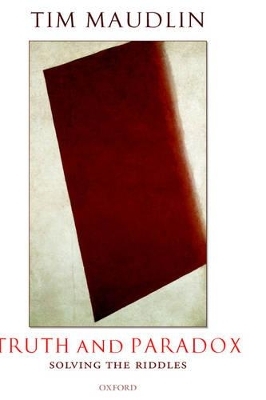
Truth and Paradox
Solving the Riddles
Seiten
2004
Oxford University Press (Verlag)
978-0-19-924729-5 (ISBN)
Oxford University Press (Verlag)
978-0-19-924729-5 (ISBN)
Consider the sentence 'This sentence is not true'. It seems that the sentence can be neither true nor not true, on pain of contradiction. Certain notorious paradoxes like this have bedevilled philosophical theories of truth. The author presents an account of logic and semantics which deals with these paradoxes.
Truth and Paradox offers a comprehensive account of truth values and the norms governing claims about truth, based on a new approach to logic and semantics. Since the seminal work of Tarski in the mid-twentieth century, the Liar paradox and other related paradoxes have stood in the way of a precise philosophical account of truth. Tim Maudlin draws on analogies from mathematical physics to explicate the origin of classical truth-value gaps, and to provide an account of truth that avoids any hierarchy of languages or of truth predicates. He also closely investigates our reasoning about truth, including apparently unobjectionable reasoning about the paradoxical sentences. The fallacies in that reasoning are located not in any inferences concerning truth, but in the foundations of standard logic. Blocking the paradoxical arguments requires emendation of classical logic, and the requisite emendations call into question the existence of any a priori logical truths. Maudlin also includes a discussion of facts and factuality, most particularly the question of whether there are any facts about truth.
All philosophers interested in logic and language will find this a stimulating read.
Truth and Paradox offers a comprehensive account of truth values and the norms governing claims about truth, based on a new approach to logic and semantics. Since the seminal work of Tarski in the mid-twentieth century, the Liar paradox and other related paradoxes have stood in the way of a precise philosophical account of truth. Tim Maudlin draws on analogies from mathematical physics to explicate the origin of classical truth-value gaps, and to provide an account of truth that avoids any hierarchy of languages or of truth predicates. He also closely investigates our reasoning about truth, including apparently unobjectionable reasoning about the paradoxical sentences. The fallacies in that reasoning are located not in any inferences concerning truth, but in the foundations of standard logic. Blocking the paradoxical arguments requires emendation of classical logic, and the requisite emendations call into question the existence of any a priori logical truths. Maudlin also includes a discussion of facts and factuality, most particularly the question of whether there are any facts about truth.
All philosophers interested in logic and language will find this a stimulating read.
1. Two Versions of the Liar Paradox ; 2. On the Origin of Truth Values ; 3. What is Truth, and What is a Theory of Truth? ; 4. A Language That Can Express Its Own Truth Theory ; 5. The Norms of Assertion and Denial ; 6. Solving the Inferential Liar Antinomy ; 7. Reasoning about Permissible Sentences ; 8. The Permissibility Paradox ; 9. The Metaphysics of Truth ; Bibliography
| Erscheint lt. Verlag | 1.7.2004 |
|---|---|
| Verlagsort | Oxford |
| Sprache | englisch |
| Maße | 163 x 242 mm |
| Gewicht | 490 g |
| Themenwelt | Geisteswissenschaften ► Philosophie ► Erkenntnistheorie / Wissenschaftstheorie |
| Geisteswissenschaften ► Philosophie ► Logik | |
| Geisteswissenschaften ► Philosophie ► Metaphysik / Ontologie | |
| Geisteswissenschaften ► Philosophie ► Sprachphilosophie | |
| ISBN-10 | 0-19-924729-3 / 0199247293 |
| ISBN-13 | 978-0-19-924729-5 / 9780199247295 |
| Zustand | Neuware |
| Haben Sie eine Frage zum Produkt? |
Mehr entdecken
aus dem Bereich
aus dem Bereich
die Grundlegung der modernen Philosophie
Buch | Softcover (2023)
C.H.Beck (Verlag)
18,00 €
Buch | Softcover (2023)
Reclam, Philipp (Verlag)
7,00 €

![Was heißt Denken?. Vorlesung Wintersemester 1951/52. [Was bedeutet das alles?] - Martin Heidegger](/media/113619842)
